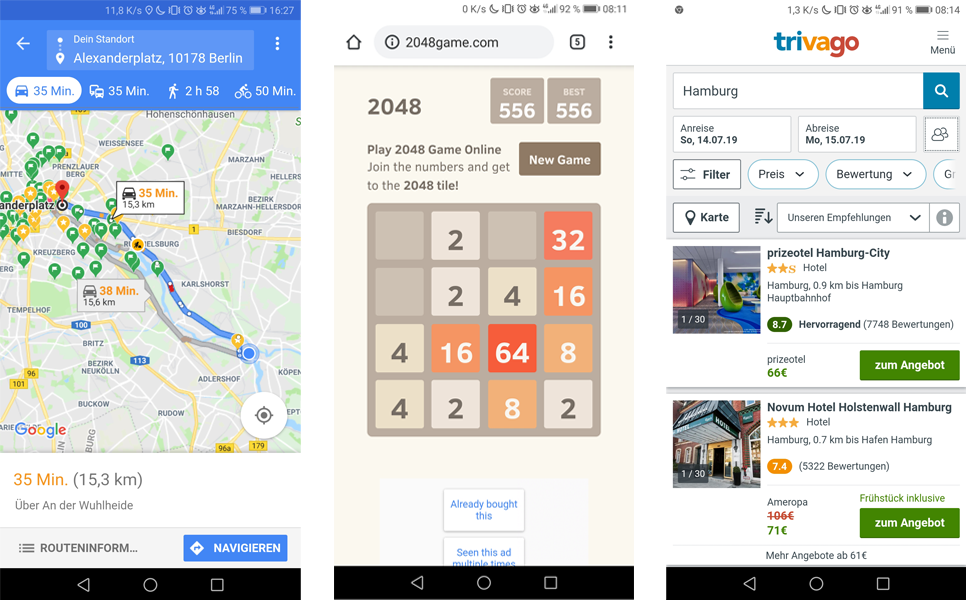Relocating to Germany: The 3 most important steps

Thinking about relocating to Germany? Want to start a new job or vocational training in Germany, perhaps even Berlin? To make the transition as smooth as possible you will need to know a few facts about Germany and the immigration process first.
silver.solutions GmbH is a software company with the main focus on e-business. We are a software manufacturer as well as a service provider. Our guiding principles are high quality standards, customer service, reliability and openness. We place great value on partnership, within the company as well as with our clients and partners.
Trust is very important for us, and this includes our staff. You will find us decisive, competent and always in a good mood. Our little international family is constantly growing and like all companies in IT sector finding new people is quite a challenge. Over the years silver.solutions has been hiring team members from different countries of the EU and all over the world who were moving to Germany. We also offer vocational training, e.g. to aspiring developers. We support our new colleagues during the relocation process to make the big step moving to a new country as smooth as possible.
But having lived in Germany from day one we are so used to some things that sometimes it did not even occur to us that they might seem strange or utterly intransparent to new arrivals. Isabell, our office assistant, has talked to our foreign colleagues and has collected a few basic facts and tips that you should be aware of when planning to move to Germany in general or to Berlin in particular.
Step 1: Moving to Germany and getting an address
An address in Germany is the very first of a number of steps you will have to take care of during the immigration process. First of all, that usually means renting an apartment. Which can’t be that difficult, right? Well, this depends. For years finding affordable accommodations in Berlin has been fairly easy. Not so much in the recent years though. The housing market in Berlin has become quite heated but it is still nothing compared to other big cities like London, Paris or New York.
There is usually a good number of appartments in any size and price range on the market – as long as you are open about the district. It doesn’t always have to be the bustling streets of hipster central Prenzlauer Berg, Mitte or Kreuzberg then you’re first moving to Berlin. How about looking a bit farther from the city centre to Treptow, Neukölln, Pankow, Marzahn or Mariendorf? The public transport network covers the city in its entirety with a large number of light railway (S-Bahn), subway (U-Bahn), tram or bus lines.
Once you found an apartment that you like and that fits your budget you will have to apply for it and convince the lessor. Which is where the paperwork starts, as you might expect from Germany. For renting an apartment there is are a number of papers required. The most important one is the SCHUFA statement. The SCHUFA is a statement about your financial situation.
Hint: Get the „SCHUFA-Auskunft“ early to raise your chances for finding an apartment
It’s a bit challenging to get it if you have no bank account in Germany. You can contact Schufa via mail or directly by phone and tell them you will need your Schufa. All they need is a current address. 90% of the real estate will prefer an applicant with Schufa. Beside the Schufa you will need your last 3 statements of the monthly salary or at least a copy of your work contract. Furthermore it is requested to prove that you have paid the rent for your previous apartment regularly.
Raquel has started working as a developer for silver.solutions GmbH two years ago. We’ve been asking her about what she thought was the most difficult part of moving to Berlin from Madrid.
Raquel: ”First time you arrive to Berlin you can’t imagine how difficult it is to find an apartment! There are some websites where people or companies announce flats for rent (some of them are translated in English). So if you find an interesting „flat advertisement“ the best option is to use the phone instead of sending e-mails. It’s more direct and you will have more possibilities to get an appointment to see the apartment.“
„In addition it’s important to know that the flats are usually without furniture. I was very surprised when I found out about it! Another problem related with the flat is, where to live? Berlin is a very big city and you can spend your day in the subway and city train traveling from one place to another. I would recommend to choose a flat in the city centre or as close as possible to your job location.“
Step 2: Registering at the „Bürgeramt“
Something that foreigners who are relocating to Germany are often not aware of is the fact that in Germany it is mandatory to register with the municipality as soon as you take up permanent residence somewhere. Usually this has to be done within the first two weeks. While in smaller communities this is something that does not require an appointment and is done within a couple of minutes, Berlin’s notoriously under-staffed and over-worked administration is a bit of a different case.
Appointments need to be made via online registration service and as those are usually in high-demand appointments up to 6 or 8 weeks in the future are not unusual. Since it doesn’t matter in which district you register it is a good idea to check all available registration offices even if they are located on the other end of the city. In urgent cases, making a call and asking for an exceptional appointment can also help.
Once you have your appointment administration staff is trying their best to help you fill out everything correctly. But please be aware that English skills in the various offices are usually limited.
Mauro, our system administrator, moved from Genova, Italy to Berlin in 2014. He has had quite positive experiences with the “Bürgeramt” when he was relocating to Germany:
Mauro: “I had no trouble with the registration and everyone at the office in Lichtenberg was very kind and helpful. My German is not perfect but the staff was more than patient and helped me to fill in the forms. They answered all of my questions in detail so I have nothing to complain about. Just for the records: Bürgeramt will automatically send the registration to the tax office. That means your TAX ID will be sent to your new address within 6 weeks.”
Hint: Non-EU citizens need to get their papers from „Ausländerbehörde“ first
For Non-EU residents before the „Bürgeramt“ there is the immigration services („Ausländerbehörde“) to deal with. This can be quite a lengthy process before you even get an appointment at the immigrations service. You have to fill out a very long form and hand in a whole bunch of documents, for example passports of all family members, marriage certificate, diplomas, of course all documents have to be translated into German. The immigration service offers great customer service for employers, but nevertheless it is a time consuming process. You have to plan about 8 weeks ahead minimum.
We asked Lucas, who moved from Costa Rica to Berlin in November 2015 what he thought about the German “immigration service”.
Lucas: “Public buildings are usually scary if you don’t know the rules, the language and also if you don’t know where to find everything. When I arrived at immigration service I was a bit lost, the place was crowded and it is very big. Luckily there are lots of signs, so if you pay attention you can get to the right place in no time. That’s a huge difference from Costa Rica, where almost nothing has signs and the streets have no names or numbers. Going back to immigration service, it was pretty straight forward, I just presented all the requested documents and the officer gave me my working permit right away.”
Step 3: Setting up a bank account
You’ve got an apartment and you’ve made everything official with the municipal office and the tax office. Now the one important thing that’s left is opening up a bank account. You absolutely need to have a bank account to receive pay checks and also to set up direct debit payment for the monthly rent. As someone from an EU country you should have no trouble at all opening up a bank account. An ID or passport is all it takes. To be on the safe side a copy of your registration statement is also good to bring. For Non-EU citizens banks normally ask for a work permit alongside passport and registration statement.
Here’s what Lucas experienced when he was moving to Germany while opening a bank account.
Lucas: “My feeling about this country is that there is nothing in between, you can or you cannot. And the bank fits into this binary category. First I tried to open a bank account, but I didn’t have the working permit yet, so it was impossible. Later on I got the working permit and opened the bank account in a snap. If you have the required documents everything works perfectly, if you don’t have the required documents you just can’t do it. As an opposite situation I have friends who tried to open a bank account in Spain without a working permit, and with different branches of the same bank they got different results, in the end they could open the account without a working permit in certain branches. Not so much in Germany.”
Apartment, registration, bank account – check! Now you’re pretty much all set for rest of the adventure off arriving in Germany. Here’s some more facts about mastering daily life in your new home.
Some facts about the basic necessities when relocating to Germany
Telephone and internet
Telephone and internet are pretty much one of the first things your new apartments needs to be equipped with. Which does not sound like a big deal at all. But depending on where you live you will have different providers to choose from and you will have to figure in up to 8 weeks for the connection to be set up. In some places you will be able to connect to the internet via cable connection, in other places you only get the slower DSL connection (via telephone line). Telekom used to be the state owned enterprise who delivered all telecom services until the deregulation at the end of the 90s. Telekom is still the most used provider in Germany. Other big name companies are Vodafone/Vodafone Kabel, 1&1, Unitymedia and O2.
We asked Lucas about what he thought getting internet connection in Berlin was like compared to back in Costa Rica.
Lucas: “It was definitely more difficult to get an internet connection here in Berlin. I really did not see this coming. It’s a common saying that everything works pretty well in Germany. But internet connection is not like that. It took more than five weeks before I had internet connection in my flat. Despite the fact that Costa Rica has probably only one IP class C for the whole country, it is quicker to get a connection there.”
Groceries and shopping
Germany has a very diverse market for grocery stores. Staple foods and goods are usually quite cheap compared to other countries and most people buy those at one of the various discount chains. For a wider selection big super market chains carry pretty much everything from flour over cereals to bed linens. Other options for one-stop shopping are classic department stores.
Depending on where you are coming from opening hours in Germany might take some getting used to. Most discount stores are open Monday through Saturday from 8:00 am to 8:00 pm. The bigger super markets usually are open till 10 at night. Most other stores don’t open before 10 am and sometimes close as early as 6 pm. Saturdays especially smaller shops close as early as 1 o’clock in the afternoon. Sundays shops are closed. But lots of bakeries will sell freshly baked goods until about noon. State laws pretty much forbid 24/7 shopping with some small exceptions. If you are in desperate need of something on a Sunday afternoon try the next gas station (they usually have a small shop attached) or a big train station. In Berlin there is also the lovely institution of a „Späti“ which translates to something like „late shopping“.
Credit or debit card versus cash
While in some countries cash payment is a dying species it is very much alive and dancing in Germany. More than 50% of sales in retail stores are generated through cash payment. Don’t be surprised to find signs on the door that read „cash only“ even in busy cafés and bars in the international and very hip Berlin city center. Also bakeries, tabac shops and other small shops often times don’t accept credit or debit cards. And even if a store does take plastic cards it is not sure they will accept YOUR particular brand of credit card. The safest bet is to always carry at least some cash and a debit card from a German bank as those are the most likely to be accepted.
So that’s it for our little 101 of moving to Germany. Of course there is lots more fun stuff to be discovered. Berlin is such a big, diverse city that it offers activities for every taste and inclination. And if big city life gets too stressful sometimes there’s the entirety of the surrounding Brandenburg countryside open for adventuring.
You’ve got questions or would like to share your own experiences arriving in German? Feel free to comment and share 🙂
Bildquelle: sashagala/Shutterstock.com
https://blog.silversolutions.de/2016/12/b2b-praxis/relocating-to-germany-3-important-steps/https://blog.silversolutions.de/wp-content/uploads/2016/12/brandenburger-tor_shutterstock_12986896_banner-1024x498.jpghttps://blog.silversolutions.de/wp-content/uploads/2016/12/brandenburger-tor_shutterstock_12986896_banner-150x150.jpgB2B.praxisIn eigener Sache,Jobs,Praxis,Tipps & TricksBrandenburger Tor, Berlin Thinking about relocating to Germany? Want to start a new job or vocational training in Germany, perhaps even Berlin? To make the transition as smooth as possible you will need to know a few facts about Germany and the immigration process first. silver.solutions GmbH is a...Susan GutperlSusan Gutperlsug@silversolutions.deAdministratorSusan Gutperl war von 2009 bis 2018 als Marketing- und Content-Managerin bei silver.solutions tätig. Hier im Blog war Susan zuständig für Redaktionsplan, Marketing-orientierte Artikel, bemühte sich um die Motivation der IT-Kollegen zum Schreiben von Beiträgen und übernahm die Endredaktion. Nach dem Studium der Verlagsherstellung hat sie bei einem IT-Dienstleister, einer Internet-Agentur, einem Fachverlag und einem Internet-Startup in den Bereichen Projektmanagement und Marketing/Vertrieb das Internet von verschiedenen Blickwinkeln kennengelernt und neue Entwicklungen mit begleitet.silver.solutions



